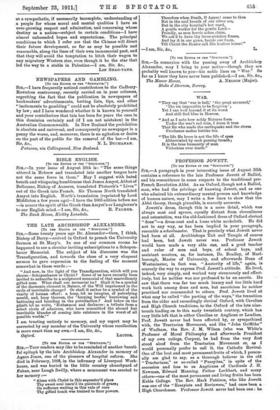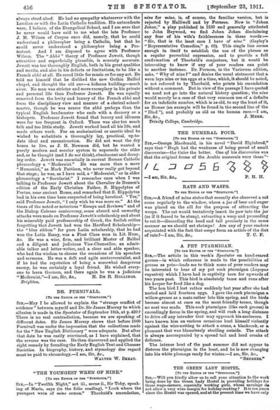PROFESSOR JOWETT. [To THE EDITOR OF THE " SPECTATOR: * J
Sin,—A paragraph in your interesting issue of August 26th contains a reference to the late Professor Jowett of Balliol, and his resemblance in some respects to the traditional pre- French Revolution AMA. As an Oxford, though not a Balliol, man, who had the privilege of knowing Jowett, and as one who admired his extraordinary mental powers and knowledge of human nature, may I write a few lines to show that the Abbe theory, though plausible, is scarcely accurate.
Jowett's dress, though this is a mere detail, which was always neat and spruce, equally distant from slovenliness and ostentation, was the old-fashioned dress of Oxford clerical " dons "—a dress-coat and a loose white neckcloth. He did
not in any way, as has been implied in your paragraph, resemble a schoolmaster. That is precisely what Jowett never had been at all. Archbishops Tait and Temple of course had been, but Jowett never was. Professor Jowett would have made a very able one, and a good teacher and ruler of men and boys, of school boys, and assistant masters, as, for instance, Dr. Bradley, of Marl- borough, Master of University, and afterwards Dean of Westminster, in fact was. " Austerity of life," again, is scarcely the way to express Prof. Jowett's attitude. He lived, indeed, very simply, and worked very strenuously and effect- ively, but be neither was nor professed to be an ascetic. He saw that there was far too much luxury and too little hard work both among dons and men, but asceticism he neither practised nor commended to others. Prof. Jowett lived at what may be called " the parting of the ways," the transition from the older and exceedingly clerical Oxford, with Caroline and High Church traditions, to the Oxford of the late nine- teenth leading on to this early twentieth century, which has very little left that is either Caroline or Anglican or Laudian. Prof. Jowett never had been affected by, or sympathized with, the Tractarian Movement, and like "John Griffiths" of Wadham, the Rev. J. M. Wilson (who was White's Professor of Moral Philosophy and afterwards President of my own college, Corpus), he had from the very first stood aloof from the Tractarian Movement or, as I would personally prefer to call it, the Catholic Revival. One of the best and most permanent fruits of which, I person- ally am glad to say, as a thorough believer in the old " Tractarians," or so-called " Puseyitee," in spite of the secession and loss to us Anglicans of Cardinals J. H. Newman, Edward Manning, Father Lockhart, and many others—one of the most permanent and living fruits has been Keble College. The Rev. Mark Pattison, who like Jowett was one of the "Essayists and Reviewers," had once been a. High Churchman. Professor Jowett never had been one : he always stood aloof. He had no sympathy whatsoever with the Laudian or with the Latin Catholic tradition. His antecedents were, I believe, of the Evangelical School, and I am sure that he never would have said to me what the late Professor J. M. Wilson of Corpus once did, namely, that he could understand a philosopher being a Catholic, but that he could never understand a philosopher being a Pro- testant. And I am disposed to agree with Professor Wilson. The " Abbe " theory of Professor Jowett, though attractive and superficially plausible, is scarcely accurate. Jowett was too thoroughly English, both in his great qualities and merits, and also in his defects or limitations, to be like a French abbe at all. He cared little for music or for any art. He told me himself that he disliked the new Gothic Balliol chapel, and thought the old one—a hideous building—much nicer. No man was stricter and more exemplary in his private and personal life than Professor Jowett. He was equally removed from the levity and luxury of the French abbe and from the disciplinary view and manner of a clerical school- master, though he was nearer the abbe perhaps than the typical English headmaster who ends with a deanery or a bishopric. Professor Jowett found that luxury and idleness were far too frequent in Oxford. There was also too much talk and too little study. Jowett worked hard all his life, and made others -work. For an ecclesiastical or ascetic ideal he wished to substitute a thoroughly lay, practical, up-to- date ideal and reconstruction. He did not want the dry bones to live, as J. H. Newman did, but he wanted a purely modern and secular system to supersede the older and, as he thought (and I do not think), obsolescent and decay- ing order. Jowett was essentially in current Roman Catholic phraseology a "Modernist." He was more than a mere " Humanist," as Mark Pattison, who never really got beyond that stage ; he was, as I have said, a "Modernist," or in older phraseology a " Secularist." I remember once when I was talking to Professor Jowett about the Chevalier de Bunsen's edition of the Early Christian Father, S. Hippolytus of Portus, near ancient Rome, and remarked that S. Hippolytus bad in his own time been suspected of being heretical. "Yes," said Professor Jowett, "I only wish he was more so." At the times of the noted or notorious " Essays and Reviews " and of the Bishop Colenso controversy, some absurd and unworthy attacks were made on Professor Jowctt's scholarship and about his miserably paid professorship of Greek, the foolish critics forgetting that Jowett had won the Hertford Scholarship— the "blue ribbon" for pure Latin scholarship, that he had won the Latin Essay, was a First Class man in Lit. Hum., &c. He was a wise, firm, and brilliant Master of Balliol and a diligent and judicious Vice-Chancellor, an admir- able talker and letter-writer, and a clear and able speaker, who had the wisdom to choose the occasions of his speeches and sermons. He was a deft and agile controversialist, and if he had the reputation of being a somewhat dangerous enemy, he was certainly a loyal friend. He wished every- one to learn German, and there again he was a judicious
" Modernist."—I am, Sir, &e., H. DE B. HOLLINGS. Brighton.







































 Previous page
Previous page